How to Collect Comic Books
Updated: 16 Jan 2026

Old comic books have value and are sought after by collectors.
Below is an overview of how to collect comic books, which comic book to collect, and how to store your collection.
Which Comic Books to Collect?
1. First appearance:
The crème de la crème is the first appearance of a familiar comic character (superhero or villain).
The more familiar the character is AND the older the first appearance is, the greater its value.
The quality of a comic book is also a consideration. Therefore, it is important to protect comic books and to store them safely (more on that later).
2. Second appearance and Origin:
The second appearance (and even third) of a character has value, as does the comic book that tells about the origin of a character.
Sometimes the second appearance and the origin of a character occur in the same comic book.
3. Movies and TV series based on comic books:
In recent years, the phenomenon of movies based on comics characters has gained momentum. Following the success of the films, the comics characters also reached the small screen.
For collectors, when a comic character stars in a movie or a television series, its value increases significantly.
The reasons are that the character is exposed to a new audience and that it gets a certain prestige.
4. Special events:
Significant events in the life of a character, or in a world where the character lives, have value for collectors.
For example, the wedding of a familiar comics character, the death of a familiar character, and even a one-time encounter between Marvel Comics and DC Comics characters.
5. Costumes:
Most superhero characters have a unique outfit.
When a character receives a new outfit as part of the redesign, it is considered a valuable comic book for collectors.
6. Series of comic books:
There are series of comic books that are published monthly or quarterly.
A complete series is valuable for collectors, depending on the characters or storyline and how old it is.
From a time perspective, it is easier to purchase a whole series if one finds it than to collect each comic book in that series.
That said, the "hunt" for individual comic books in order to complete a series is the fun part of being a collector.
7. Figure / Writer / Illustrator:
Collecting comics is a personal thing. Each collector has different preferences.
There are collectors who focus on collecting comic books of a certain figure or of a certain writer or illustrator.
Here, too, there is value to the first comic book that a particular writer or illustrator wrote or painted, as well as the second and third.
8. Signature
Many collectors regard a comic book signed by its creator as valuable.
For other collectors, ANY writing on a comic book lowers its value.
Comic Book Grading
Since the introduction of superhero comic books in the 30s, comic books have gained popularity with time.
From the 80s, comic books were printed in huge numbers, making them less rare and therefore less valuable for collectors.
Rarity, age, and popularity are the key factors.
Another important aspect to pay attention to is the condition of a comic book.
The higher the condition of a comic book, the more valuable it is.
Here are the terms collectors and dealers use for grading, from best to worst:
- Mint (MT)
- Near Mint (NM)
- Very Fine (VF)
- Fine (FN)
- Very Good (VG)
- Good (GD)
- Fair (FR)
- Poor (PR)
Some dealers and collectors use more grades in between these grades (for example, VF/NM). Some use the + and - signs (for example, VF+) or just one letter (for example, G for Good).
As mentioned above, comic book condition translates to value.
Problem:
While there are standard terms for grading a comic book, there is a conflict of interest between buyers and sellers.
Sellers might benefit from a higher-grade comic book and therefore argue that a comic book is in better condition in their opinion.
The opposite argument might occur by buyers.
Solution:
There are companies that provide grading services.
This service comes at a cost, both in time and money. At the end of the process, the comic book is graded and delivered back to its owner.
Graded comics are sealed in hard plastic.
The 3 main grading service companies are CGC, CBCS, and PGX.
In some cases, graded comic books are higher in value and more trustworthy.
For valuable comic books, grading service is something worth considering.
Collecting Comics by Age

The value of comics, which belong to the American comics market and are based on superheroes, is also determined by the age in which they were published.
Golden Age of Comic Books:
In this age, which lasted from the late 1930s to the early 1950s, the prototype of the superhero was created together with some of the most famous superheroes, including Superman (1938), Batman (1939), Flash (1940), Captain America (1941), Wonder Woman (1941), and many more.
During this era, some comics focused on the victory of the good against evil.
The event symbolizing the beginning of this era is the comic book publication Action Comics #1, in which Superman first appears.
Silver Age of Comic Books:
After an interim period, in which the popularity of comics came down, the Silver Age began in 1956 and continued until around 1970.
This era began with the renewal of many comic figures from the past, such as the Flash and Captain America, whose publication was discontinued in the interim period, as well as the creation of new characters with human characteristics such as feelings and fears and with human concerns such as payment of rent.
Among the most prominent figures created in the Silver Age are the Fantastic Four (1961), The Incredible Hulk (1962), Spider-Man (1962), Ant-Man (1962), and X-Men (1963).
The Silver Age also symbolizes the beginning of collecting comic books as a hobby.
Bronze Age of Comic Books:
The Bronze Age symbolizes the period between 1970 and 1985.
This age keeps many of the features of the Silver Age, and the leading characters from the Silver Age still lead the market.
Nevertheless, there is a return, as in the Golden Age, to dealing with dark subjects. Stories are adapted to political and social issues such as racism, alcohol and drug use, poverty, and environmental pollution.
The Bronze Age is also characterized by the leading roles of anti-hero characters such as Ghost Rider (1972), The Punisher (1974), the mutant Wolverine (1974), and others.
Modern Age of Comic Books:
The Modern Age of comic books began in the mid-eighties and continues to this day.
This is a time when the familiar characters have been redesigned and have become darker, and the stories have become longer and more complex.
This period also marks the rise of independent publishers.
Comic Book Information
Research any comic book before purchasing.
There are countless websites dedicated to fans and collectors.
One of my favorites is Comic Vine. It lets you search for characters, issues, movies, TV shows, and more.
Wikipedia is another great source for information on comics. On the topic in general, or for a specific issue, character, or event.
In addition, both DC Database and Marvel Database are full of information you may look for.
For prices, you can search eBay and Amazon for a specific comic book and take notes on the price range depending on condition and grading.
Comic Books from My Private Collection
First Appearances:
Over the years, 3 characters have served as Ant-Man: Hank Pym, Scott Lang, and Eric O'Grady.
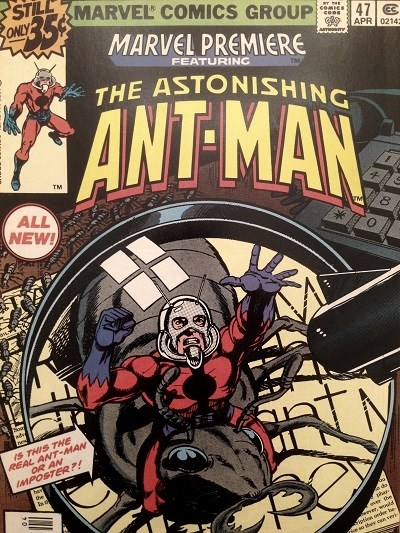 Scott Lang, first appearance
Scott Lang, first appearanceas Ant-Man, 1979
 The first appearance of
The first appearance ofHercules, 1965
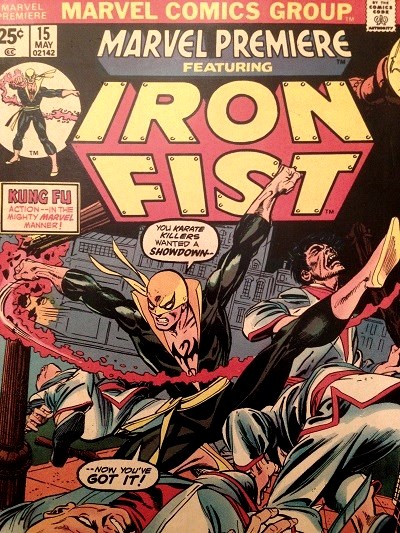 The first appearance of
The first appearance ofIron Fist, 1974
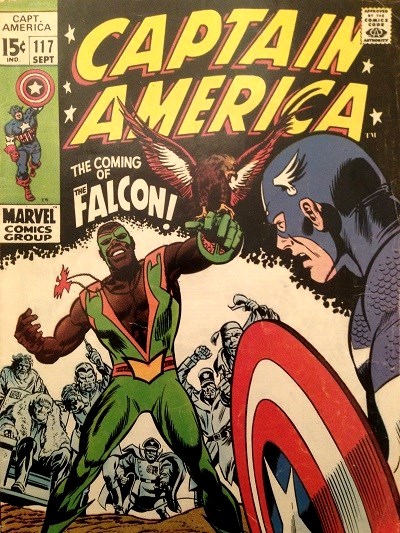 The first appearance of
The first appearance ofFalcon, 1969
Second Appearance and Origin:
The Black Panther is the first black superhero.
He was followed by other black superheroes such as Falcon, Luke Cage, and others.
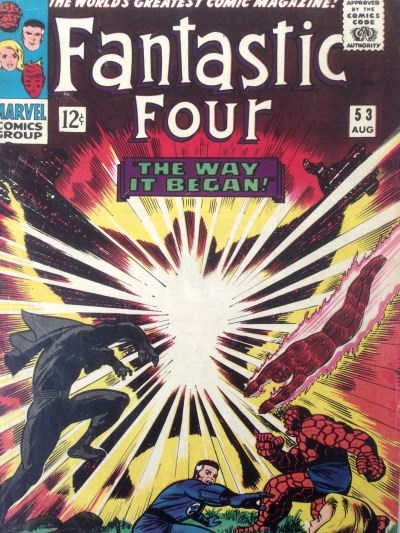 Black Panther
Black PantherSecond appearance & Origin, 1966
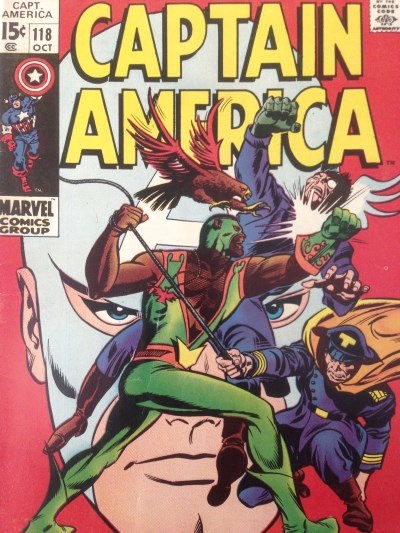 Falcon
FalconSecond appearance, 1969
Comic Books with Special Events:
Hawkeye was interested in the Scarlet Witch, but she developed an attraction to Vision, which led to a wedding.
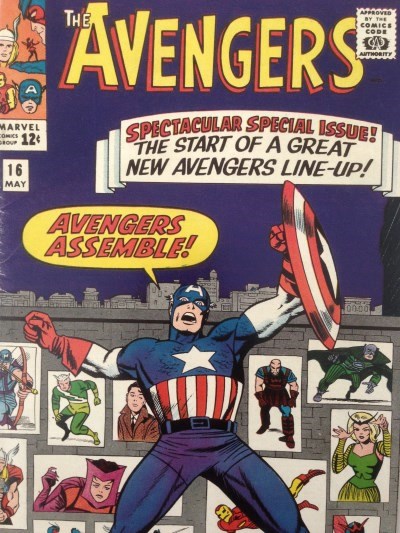 Hawkeye joins the Avengers, 1965
Hawkeye joins the Avengers, 1965
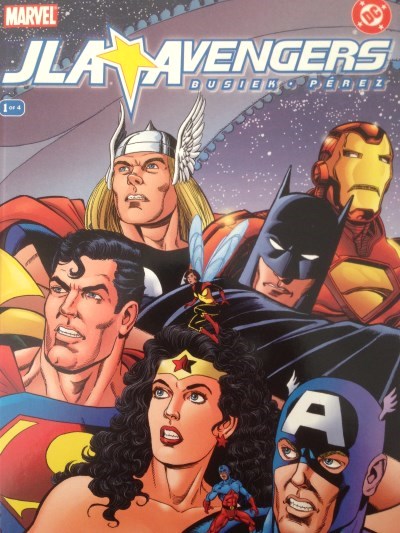 JLA & Avengers, 2003-4
JLA & Avengers, 2003-4
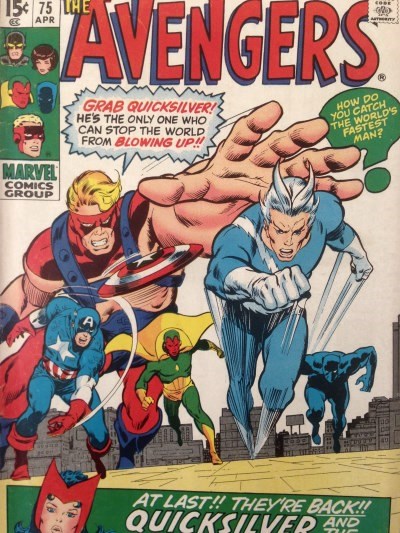 Scarlet Witch becomes love
Scarlet Witch becomes loveinterest in Vision, 1970
 Scarlet Witch & Vision Wedding
Scarlet Witch & Vision WeddingJune 1, 1975
Complete Series:
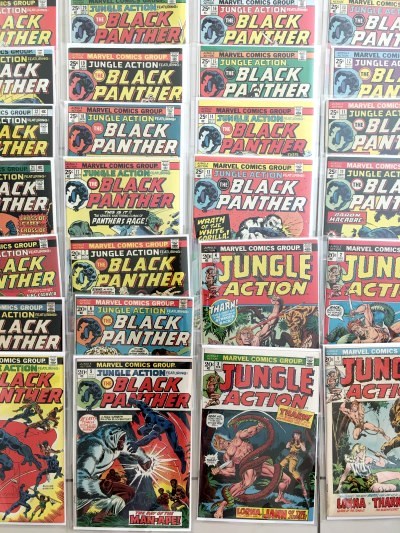 First solo Black Panther
First solo Black PantherJungle Action 1-24, 1972-1976
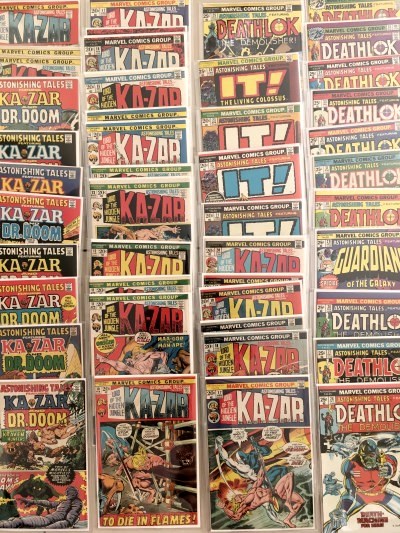 Mockingbird, Deathlok & more
Mockingbird, Deathlok & moreAstonishing Tales 1-36, 1970-1976
How to Store and Protect Comic Books?
Hands:
It is a good practice to wash and dry hands before handling comic books, especially old and valuable ones.
Bags:
To protect each comic book, it should be wrapped in a special plastic bag and an acid-free backing board.
The role of the backing board is to prevent bending.
Protective comic bags are sometimes called covers or sleeves.
Mylar bags are more expensive, but they are considered the best way to store paper.
Common thicknesses for bags made of Mylar (archival polyester) are 2 mil (regular) and 4 mil (thick).
Each comic book stored in a box should be covered by a bag to protect it from insects like silverfish.
Boxes:
Comic books can be stored in a special comic book box, which can be purchased at comic book stores or online.
Boxes for comics are usually made of cardboard, but some are made of plastic.
The two common sizes for boxes are short and long. Other types exist.
Boxes with comic books should be stored away from direct sunlight and humidity.
 Mylar bag & backing board
Mylar bag & backing board
 Boxes for storing comics
Boxes for storing comics
Good to know:
Comics from different periods come in different sizes.
The size of the cover and backing board is determined by the age of the comic book.
Most common sizes for cover bags for comics are golden, silver, current, and magazine. Some brands use other terms for the bag sizes.
In addition, there are frames designed for displaying comic books.
Drawing Comics
It is fun to read comic books, but it is also fun to draw them. Here is a guide I wrote on how to draw cartoon characters from observation.
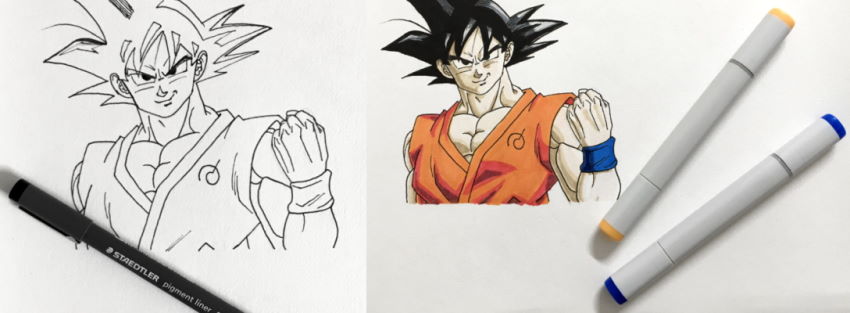
Linear perspective is an important drawing fundamental for any comics artist.
You are welcome to visit my perspective drawing guide.

After you learn to draw from observation and perspective, you might want to learn how to draw from imagination.

Summary
Fun facts:
The Library of Congress of the United States holds the largest collection of comic books, with about 100,000 comic books.
Action Comics #1, featuring Superman for the first time, was sold for more than US$3 million on eBay in 2014.
This comic book, which was published in 1938, is considered the comic book that began the genre of superheroes.
Where to buy or sell comic books:
Comic books can be bought or sold in any local comic book store.
Today, most comic book trade is done online. Websites like eBay and Amazon are a good place to start.
Personal note:
I enjoy having a large comic book collection with many of my favorite superheroes.
That said, if I had to do it again, I might do it differently. Meaning, focus on a few valuable comic books. A large collection requires a large storage space.
*All images of comic books are from my private collection.